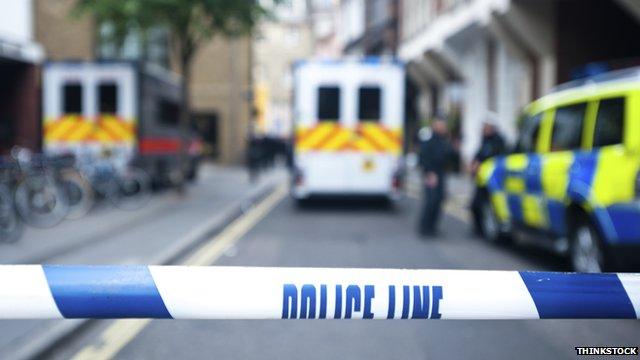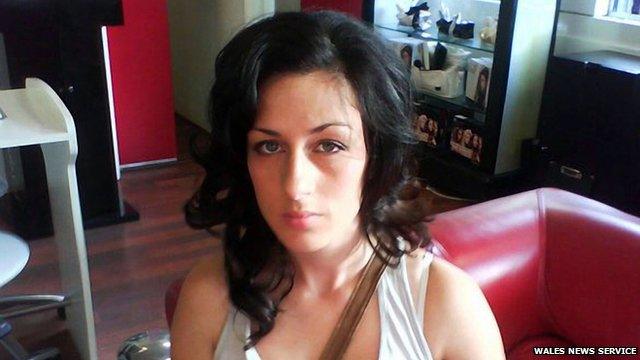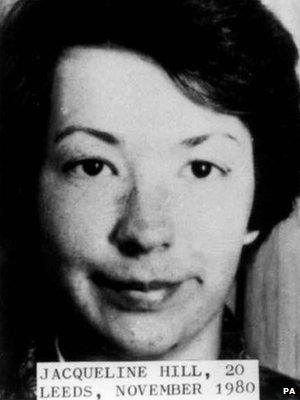Analysis: Why can’t we sue the police for negligence?
- Published

Negligence: When it comes to the police, it's the legal line that can't be crossed
You call the police in your moment of need and they don't turn up until it's too late.
But while you may want to drag them through the courts, your chances of winning - for now - are probably nil.
That's the result of an important Supreme Court judgemen, externalt which has underlined the long-standing legal principle that police cannot be sued for negligence because they have a special position in public service and under the law.
If a barrister bungles your case, you can sue. If a firefighter turns off a building's sprinklers amid an inferno, you might have a case for damages.
But you can't take on the police in the same way - which is just what the family of Joanna Michael have tried and failed to do.
Ms Michael was 25 when she was murdered by her former boyfriend in her home in St Mellons, Cardiff.
In August 2009, Cyron Williams broke into her home after learning she had a new man in her life. Williams bit her ear, threatened to kill her and took the other man into his car.
She dialled 999 from her mobile - but her call went through to the wrong control room - Gwent rather than South Wales Police.
She said Williams had threatened to kill her - but by the time patrolling officers from South Wales Police were on the case, the call had been downgraded, giving them an hour to get to the scene.

The Independent Police Complaints Commission (IPCC) ruled that murder victim Joanna Michael, 25, was failed by South Wales and Gwent Police
Around 15 minutes later, Joanna Michael was dead. When Williams returned to her home, she made a second 999 call. Gwent's control room heard her screams. Williams stabbed the mother-of-two to death and he is now serving a life sentence for murder.
Legal shield
Since then, the two police forces have apologised for their mistakes - but they can't be sued for negligence damages which could go towards supporting Ms Michael's children.
And it all comes down to a long-standing legal shield that was created for the police in the wake of allegations of blunders and bungling by detectives on the hunt for the Yorkshire Ripper.

The family of Yorkshire Ripper victim Jacqueline Hill tried to sue West Yorkshire Police for negligence
The last woman to be killed by Peter Sutcliffe before his 1981 arrest was Jacqueline Hill, a student at Leeds University.
Her mother sued West Yorkshire Police, arguing that her daughter would have still been alive if the investigation had followed up the existing clues leading to the serial killer.
But in a 1988 ruling, the Law Lords said that the police could not be held liable, external because the public interest lay in protecting the police from negligence claims.
Why? Because, quite simply, they wouldn't be able to police properly if they were constantly looking over their shoulder waiting for the next writ to be thrown at them.
Chief constables would shift all of their resources into tactics designed to avoid ending up in court, rather than trying the best for the whole of the community.
The principle that the police owe no duty of care to specific people remained largely untouched until 1998, when the European Court of Human Rights intervened in a case called Osman.
An obsessive teacher had stalked his former pupil, Ahmet Osman, and eventually killed his father, Ali.
The family argued successfully that the Metropolitan Police had breached Mr Osman's right to life , externalbecause the force had all the information it could ever have needed to deal with the threat.
That ruling had a profound impact on the police. Chiefs have since developed a complex methodology for assessing risks. They even send formal letters known as "Osman warnings" to people who they suspect may face a risk to their life. Here's a model Osman letter, external.
Stephen Lennon, the former leader of the English Defence League, is one such recent recipient.
Who's legally to blame?
But the law around Osman only goes so far - and Wednesday's Supreme Court judgement underlines that.
In the lead judgement, Lord Toulson said the law is clear that the only person who is to blame for harm is the person who caused it.
He ruled that even if the police could be reasonably aware of a threat to life, that does not mean they have an immediate duty of care to that specific individual which overrides everything else they must do.
Does the door remain open for another challenge? Two of the seven Supreme Court judges ruled in the family's favour. Lord Kerr and Lady Hale said that if any case crossed a high bar for suing the police for negligence, then it would be the death of Joanna Michael.
That means that in the past decade three of our most senior judges - the other being the late Lord Bingham - have argued that the police should, sometimes, face the music. So the pendulum may be on the turn towards making the police liable.
Nicholas Bowen QC, represented the family in the challenge. He said: "There is now a fundamental disagreement at the highest level as to whether it is in the public interest for the police to retain their long standing protection from legal liability when they know of an imminent threat to a particular individual and have the means to protect them but unreasonably fail to safeguard someone from the risk of serious harm or death.
"As the two dissenting [Supreme Court] justices found, it does seem anomalous and arbitrary to find that if the call handler uses positive language and expressly promises a prompt attendance there is liability - but if it is implicit in the interchange but not spelt out that the police are coming rapidly, there is no remedy.
"We will consider taking the case to Strasbourg and feel strongly that the correct approach is in Lord Kerr and Lady Hale's powerful dissenting judgments."
There has however been a legal victory of sorts for Joanna Michael's family. The Supreme Court says they can still sue under human rights law for a breach of a right to life. That won't lead to a great deal of compensation - that's not how the system works. Refuge, the campaign group against domestic abuse, also hopes this secondary victory will give hope to other bereaved families.
But for now, Strasbourg or not, anyone else who thinks the police must pay for letting them down should know this: finding the police liable for negligence is the legal line that still can't be crossed.